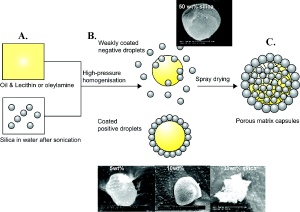May 27 2009
Scientists are reporting a potential solution to a problem that limits the human body's ability to absorb and use medications for heart disease, Type-2 diabetes, cancer and other conditions. It is a "nano-hybrid microcapsule" that enables the stomach to absorb more of these so-called 'poorly-soluble" medicines. Their study is scheduled for the June 1 issue of ACS' Molecular Pharmaceutics, a bi-monthly journal.
 Scientists report that new "microcapsules" could help the stomach absorb certain medicines. Credit: The American Chemical Society
Scientists report that new "microcapsules" could help the stomach absorb certain medicines. Credit: The American Chemical Society
Finding ways to improve the stomach's uptake of poorly soluble medicines has been one of the major challenges facing pharmaceutical companies. Estimates suggest, for instance, that 40 percent of potential new drugs fall into this category. In the new study, Clive Prestidge and colleagues note that one solution has been to include detergent-like substances in pills and capsules. However, that approach involves safety concerns, since the detergent can irritate the stomach lining, making it unsuitable for drugs that must be taken month after month.
The scientists describe development of a first-of-its-kind microcapsule made from lipid oils and nanoparticles 1/50,000th the width of a human hair. Although acting like conventional detergents, they seem unlikely to irritate the stomach. In test tube experiments, microcapsule versions of the arthritis drug, indomethacin, dissolved up to five times faster than a regular version of the drug. Lab rats given the new microcapsule version absorbed almost twice as much of the drug.